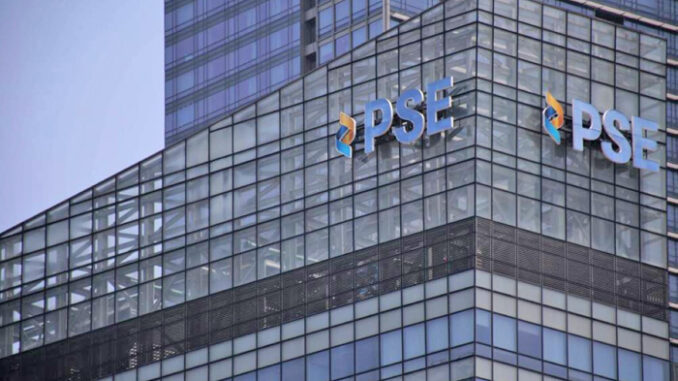
The Philippine stock market pulled back Wednesday as investors locked in on gains ahead of the release of latest inflation data from the United States.
The Philippine Stock Exchange index, the 30-company gauge, plunged by 112.73 points, or 1.50 percent, to close at 7,424.52. The broader all-shares index also declined by 44.05 points, or 1.08 percent, to settle at 4,033.36.
Analysts said investors turned cautious on concerns that the US Federal Reserve may delay aggressive rate cuts on strong US labor market and recent economic data.
The recent weakening of the peso against the dollar also caused some concerns to investors. The peso fell to 57.02 against the US dollar Wednesday from 56.90 Tuesday on concerns over rising crude prices in the Middle East.
“Philippine shares succumbed to profit-taking after briefly touching the 7,600 level as investors gear up for the US CPI,” Regina Capital Development Corp. head of sales Luis Limlingan said.
Limlingan said investor enthusiasm waned as expectations grew that the Fed may slow down future rate cuts due to a robust labor market.
All indices ended in the red, led by holding firms, which declined 1.77 percent and mining and oil which dropped 1.71 percent.
Value turnover amounted to P5.09 billion, with 122 decliners versus 72 advancers.
Jollibee Foods Corp. bucked the market’s decline, rising by 0.66 percent to P274.80, while Security Bank dipped 4.51 percent to P91.
Meanwhile, stocks in mainland China and Hong Kong tumbled on another volatile day Wednesday after Beijing disappointed investors over a lack of fresh stimulus and scant detail on its plans for implementing a raft of measures already unveiled.
After blockbuster performances in the wake of last month’s announcements to kickstart growth, traders were left deflated after a news conference on Tuesday fell short of expectations and revived worries about the outlook.
A rally on Wall Street, helped by a plunge in oil prices and optimism over the US economy, did little to lift sentiment on Chinese trading floors, although most other markets in Asia enjoyed gains.
Investors are now keeping tabs on developments out of Beijing after it said Finance Minister Lan Fo’an would hold a Saturday briefing on fiscal policy.
Traders are hoping for more indications about officials’ plans, although analysts warn there is unlikely to be the big “bazooka” stimulus akin to the support seen during the global financial crisis.
Shehzad Qazi at China Beige Book said the news conference “underscored that Beijing does not feel the need to do ‘whatever it takes’.
“Instead it’s opting for targeting stimulus — including allocating funds for projects previously announced. The irony is markets would’ve continued rallying had there been no press conference.
“The only upside of (Tuesday’s) event was injecting a much-needed dose of reality.”
Hong Kong had soared more than 20 percent between the first batch of measures being announced and Monday, but it collapsed more than nine percent on Tuesday — its worst day since 2008.
After swinging in the morning, the Hang Seng Index fell more than one percent Wednesday as traders struggled to get back on track.
Shanghai ended down more than six percent — having seen a 10 percent opening rally Tuesday pared to just over four percent by the end of the day.
Still, most other markets in the region rose as investors took their lead from New York, where tech firms led the way on optimism over the world’s top economy in the wake of Friday’s forecast-topping jobs data.
Tokyo rose, with Seven & i Holdings — the owner of the 7-Eleven convenience store chain — piling on 12 percent after a report said Canada’s Alimentation Couche-Tard had hiked its takeover offer for the company by almost 20 percent to $47.2 billion. It eased back later to end almost five percent higher.
Sydney, Singapore, Taipei, Wellington, Bangkok and Mumbai also rose, along with London and Paris. Frankfurt, Manila and Jakarta dipped.
While the US jobs figures dented expectations for a second successive bumper interest rate cut this month, they did temper worries about a possible recession.
US consumer and producer prices data towards the end of the week should provide further clues on the interest rate outlook, while third-quarter earnings season kicks off on Friday.
Oil prices inched up but made little headway into the losses of almost five percent suffered in the previous session that came on the back of doubts about Chinese demand and after Israel faced international pressure not to strike Iranian crude installations.
Fears about Israel’s response to Iran’s missile attack last week had sent the commodity soaring Monday to its highest levels since August.
Healthy US stockpiles and expectations of ample supply both in and out of OPEC also weighed on oil prices. With AFP


Be the first to comment